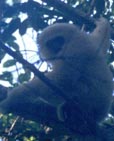|
 The
White Handed Gibbon varies from black and dark-brown to light-brown,
sandy colours. Their hands and feet are white-coloured and a ring
of white hair surrounds the black face. They are true brachiators,
propelling themselves through the forest by swinging under the branches
using their extremely long arms and curved fingers on elongated
hands. They subsist principally upon fruit and leaves, with insects
and flowers forming the remainder of their diet in the dipterocarp
forest, including primary lowland and submontane rainforest, mixed
deciduous bamboo forest, and seasonal evergreen forest of Indonesia,
Laos, Malaysia, Myanmar and Thailand. Family groups inhabit a firm
territory, which they protect by warding off other gibbons with
their calls each morning. Each species has a typified call and each
breeding pair has unique variations on that theme. Mating occurs
in every month of the year, but most conceptions occur during the
dry season in March, with a peak in births during the late rainy
season, in October. On average, females reproduce for the first
time at about 11 years of age, gestation is six months long, and
pregnancies are usually of a single young. Young are nursed for
approximately two years, and full maturity comes at about eight
years. Their life expectancy is about 25 years. The white-handed
gibbon is threatened in various ways: they are sometimes hunted
for their meat, sometimes a parent is killed to capture young animals
for pets or to be imprisoned in zoos, but perhaps the most pervasive
is the loss of habitat through forest clearance for the construction
of roads, shifting agriculture, ecotourism, domesticated cattle
and elephants, forest fires, subsistence logging, illegal logging,
new village settlement, and palm oil plantations. The
White Handed Gibbon varies from black and dark-brown to light-brown,
sandy colours. Their hands and feet are white-coloured and a ring
of white hair surrounds the black face. They are true brachiators,
propelling themselves through the forest by swinging under the branches
using their extremely long arms and curved fingers on elongated
hands. They subsist principally upon fruit and leaves, with insects
and flowers forming the remainder of their diet in the dipterocarp
forest, including primary lowland and submontane rainforest, mixed
deciduous bamboo forest, and seasonal evergreen forest of Indonesia,
Laos, Malaysia, Myanmar and Thailand. Family groups inhabit a firm
territory, which they protect by warding off other gibbons with
their calls each morning. Each species has a typified call and each
breeding pair has unique variations on that theme. Mating occurs
in every month of the year, but most conceptions occur during the
dry season in March, with a peak in births during the late rainy
season, in October. On average, females reproduce for the first
time at about 11 years of age, gestation is six months long, and
pregnancies are usually of a single young. Young are nursed for
approximately two years, and full maturity comes at about eight
years. Their life expectancy is about 25 years. The white-handed
gibbon is threatened in various ways: they are sometimes hunted
for their meat, sometimes a parent is killed to capture young animals
for pets or to be imprisoned in zoos, but perhaps the most pervasive
is the loss of habitat through forest clearance for the construction
of roads, shifting agriculture, ecotourism, domesticated cattle
and elephants, forest fires, subsistence logging, illegal logging,
new village settlement, and palm oil plantations.
|
 The
White-Handed Gibbon - Issue Seventeen
The
White-Handed Gibbon - Issue Seventeen